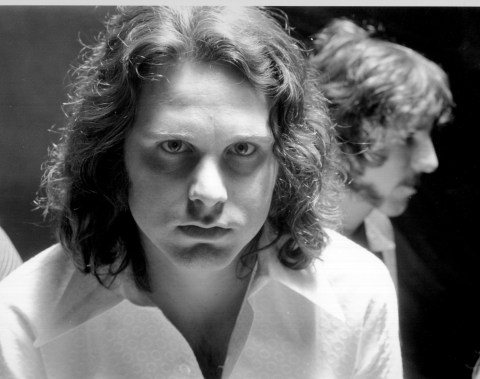
When two legends intersect — one known for redefining American folk music and the other for turning rock ‘n’ roll into a spiritual ritual — the conversation is never ordinary. In a rare and heartfelt revelation, Bob Dylan recently spoke about the deep, emotional connection he feels to Jim Morrison’s poetry. “Sometimes I just cry reading his stuff,” Dylan confessed. “It’s not sadness. It’s release. There’s a way Jim touches your spirit — it’s not gentle, it’s like he digs down with bare hands and pulls.” For fans of both icons, this moment of vulnerability uncovers the enduring power of Morrison’s words.
Dylan, who himself is a Nobel Prize-winning poet and lyricist, has always been stingy with praise. But when he speaks about Morrison, there’s no holding back. He doesn’t see The Doors frontman as just another rock singer — he sees a tortured prophet, a poet who wrote from a place of raw, unfiltered consciousness. “Jim didn’t dress up his words,” Dylan said. “He burned them on the page. Every line felt like it was torn from his bones.”
Jim Morrison, often dubbed the “Lizard King,” lived a life of excess and mystery. But beneath the drugs, the sex, and the rebellion, there was a man fiercely devoted to words. He published poetry throughout his life — much of it dark, surreal, and drenched in spiritual longing. For Dylan, that poetic undercurrent was what made Morrison so compelling. “When I hear ‘The End’ or ‘Celebration of the Lizard,’ I’m not listening to rock. I’m listening to prophecy. That stuff could’ve been written by a 14th-century mystic.”
Dylan, known for the introspective power of songs like “Visions of Johanna” and “It’s Alright, Ma (I’m Only Bleeding),” admits that Morrison’s verses broke through a barrier he didn’t know he had. “It’s strange,” he said, “I’ve been writing for decades. I’ve seen everything — but when I read Morrison, I feel something shake loose inside me. It’s not polished. It’s primal.”
The rawness Dylan speaks of is evident in Morrison’s journals and lesser-known poetry, often published posthumously. These writings strip away the rock star persona and reveal a man haunted by dreams, death, and the vast, unknowable spaces in between. Dylan recalled reading one such piece late at night. “I couldn’t stop the tears. Not because it was sad — but because it was so honest. He wrote like a man with nothing to lose.”
What separates Morrison from many of his contemporaries, Dylan believes, is his refusal to filter his emotions. “He didn’t care if you understood him,” Dylan said. “He wasn’t trying to make sense. He was just trying to feel — and that’s what great poetry does. It doesn’t explain. It breaks open.”
Their music might have traveled different roads — Dylan’s winding through folk and Americana, Morrison’s diving headfirst into psychedelic rock — but both artists wrestled with the same existential questions. Who are we? Why are we here? What lies beyond the veil? For Dylan, Morrison’s gift was his willingness to confront those questions without flinching. “He was always chasing the edge — and he brought us there with him.”
This emotional reaction from Dylan is not just artistic admiration — it’s spiritual kinship. He sees in Morrison a reflection of the artist’s struggle: the need to go deeper, even when the world demands surface-level entertainment. “Jim wasn’t putting on a show. He was cracking open his soul,” Dylan said. “Most people don’t do that — even fewer survive it.”
And perhaps that’s the tragedy of Morrison’s legacy. He didn’t survive it. Dead at 27, his flame burned too hot, too fast. But Dylan believes that in those few years, Morrison captured more truth than many do in a lifetime. “He left a map behind,” Dylan mused. “Not a map of where to go — but of what it feels like to be lost. And somehow, that’s more comforting.”
Dylan also reflected on how Morrison’s poetry might be received today — in an age of streaming and scrolls, where attention is fleeting. “Jim’s words weren’t made for TikTok,” he said, half-smiling. “You need to sit with them. You need to be alone. And then you’ll hear it — that voice beneath the voice, telling you the truth you’ve been too afraid to face.”
As Dylan continues to tour and write into his 80s, he credits Morrison’s work with reminding him why he started writing in the first place. “It’s not about being understood,” he said. “It’s about being real. Jim was realer than most. That’s why his words still echo. That’s why they still make me cry.”
In the end, this tribute from Dylan is more than just praise. It’s a quiet acknowledgement from one poet to another — a passing of the torch, perhaps. Because even though Jim Morrison’s voice was silenced too soon, his words live on, resonating in the hearts of those willing to listen. As Dylan put it best: “He didn’t write poems. He wrote truths. And truth — real truth — never dies.”